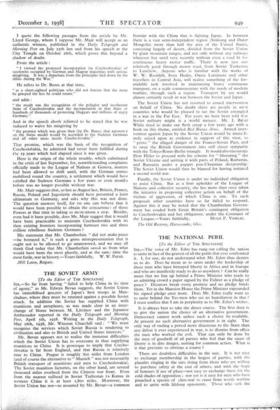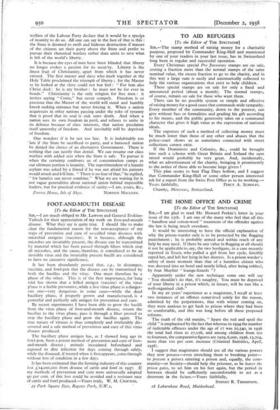THE NATIONAL PERIL [To the Editor of THE SPECTATOR] SIR,—The
voice of Mr. Eden has rung out calling the nation to unite in face of the gravest of all the perils that ever confronted it. I, for one, do not understand what Mr. Eden thus desires us to do. Does he mean us to unite under the leadership of those men who have betrayed liberty in Africa and in Europe and who are manifestly ready to do so anywhere ? Can he really mean that we line up behind a Prime Minister who reads to an admiring crowd a paper signed by the Filluer as a pledge of peace ? Dictators break every promise and no pledge binds them. Yet in the Mansion House the Prime Minister expounded his signed pledge once more. Does Mr. Eden really want us to unite behind the Yes-men who see no humiliation in that ? I must confess that I am in perplexity as to Mr. Eden's wishes.
It is always best to take the direct course. The first duty is to give the nation the choice of an alternative government. Democracy cannot work unless such a choice be available. At present no such alternative government is in sight. The only way of ending a period more disastrous to the State than any defeat it ever experienced in war, is to dismiss from office the men who worked the evil. That can only be done by the men of goodwill of all parties who feel that the cause of liberty is in dire danger, uniting for common action. What is it that prevents so obvious a course ?
There are doubtless difficulties in the way. It is not easy to exchange membership in the largest of parties, with the plaudits ringing in the ears rising from those who are willing to purchase safety at the cost of others, and with the hope of honours if not of place—not easy to exchange these for the cold shades Of opposition ; nor yet is it easy for men who have preached a species of class-war to cease from wordy warfare and to unite with lifelong opponents. Those who seek the welfare Of the Labour Party declare that it would be a species of insanity to do so. All one can say in the face of that is thi; : the State is doomed to swift and hideous destruction if masses of the citizens set their party above the State and prefer to pursue their rhetorical warfare rathei than unite to save what is left of the world's liberty.
It is because the eyes of men have been blinded that liberty no longer evokes a passion for its security. Liberty is the finest fruit of Christianity, apart from which it has never existed. The first master and slave who knelt together at the Holy Table proclaimed the triumph of liberty ; for the Master as he looked at the slave could not but feel : " For him also Christ died : he is my brother : he must not be for ever in bonds." Christianity is the only religion for free men : it invites saying " Come," but never compels. Freedom is so precious that the Master of the world will stand and humbly knock seeking entrance but never forcing it. When a nation acquiesces in other nations passing under the yoke of tyranny that is proof that its soul is sick unto death. And when a nation sees its own freedom in-peril, and refuses to unite in its defence because of class interests, that nation proclaims itself unworthy of freedom. And inevitably will be, deprived of freedom.
One wonders if it be not too late. It is indubitably too late if the State be sacrificed to party, and a harassed nation be denied the choice of an alternative Government. There is nothing that can justify that denial. We can resume our class warfare with added zest when the State is safe. To pursue it when the certainty confronts us of concentration camps as our ultimate portion is insanity. The superintendent of a lunatic asylum was asked by a friend if he was not afraid his patients would attack and kill him. " There is no fear of that," he replied, " for lunatics can never combine." What we 'are waiting for is not vague generalities about national union behind impossible leaders, but for practical evidence of sanity.—I am, yours, &c.,



























































 Previous page
Previous page